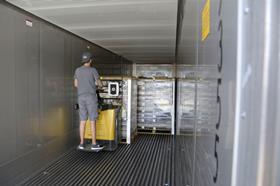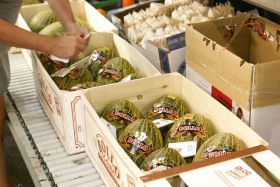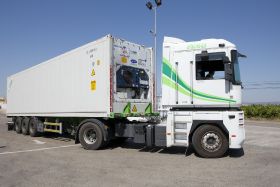
Mediterranean Shipping Company (MSC) has teamed up with one of Spain’s most iconic fresh produce brands in a pioneering Controlled Atmosphere trial that could pave the way for a significant expansion of Spanish fruit exports to Asia and other new markets.
While the use of Controlled Atmosphere technology to transport high value fruits and vegetables is becoming increasingly commonplace, its uptake among European producers has been limited –until now.
This summer, MSC and Bollo International carried out the first successful shipment of Spanish-grown Piel de Sapo melons to Hong Kong under a pilot programme that is due to be extended to other products such as persimmons and stonefruit, and will eventually be rolled out across Europe, starting with Greece and Italy.
In light of the strength of demand for imported fruits and vegetables among Asian consumers, Julio Nestar, MSC’s reefer manager in Spain, is confident that there will be no shortage of demand for the new service. China alone imported 4.4m tonnes of fresh fruit valued at US$5.59bn in 2017, a year-on-year increase of 12 per cent and 5 per cent respectively, while at 6 per cent, the growth in perishable exports from Europe to Asia is far outstripping the global growth rate of 3 per cent.
With the Chinese middle class expected to reach 630m by 2022, food demand could increase by as much as 50 per cent, Nestar believes, all of which adds up to a bright outlook for European exporters as their access to Asian markets continues to improve.
“At present Spain can only ship citrus and stonefruit to China but new protocols for other fruits such as persimmon should be signed in the coming years,” he says. “Furthermore, the European Union and Japan recently reached an important bilateral trade agreement which removes the majority of customs duties and opens the Japanese market to EU agricultural products, which will create new opportunities for European companies.”
MSC handled approximately 40,000 Controlled Atmosphere containers last year, the majority serving trade routes out of Latin America. The technology controls oxygen, carbon dioxide and ethylene levels inside the container to slow down fruit ripening, thereby extending product shelf life and ensuring cargo arrives at its destination in optimum condition. The company is now working with CA providers and technicians to have the systems installed on its containers.
Investing in growth
 The past few years have been gruelling for the container shipping industry, and as companies confront new challenges such as the sulphur cap on bunker fuel, there is little sign of calmer waters ahead. As a privately owned company, MSC retains the agility and long-term vision to withstand these challenges and face the future with optimism, as evidenced by the considerable investments it continues to make in new tonnage, reefer technologies and intermodal services.
The past few years have been gruelling for the container shipping industry, and as companies confront new challenges such as the sulphur cap on bunker fuel, there is little sign of calmer waters ahead. As a privately owned company, MSC retains the agility and long-term vision to withstand these challenges and face the future with optimism, as evidenced by the considerable investments it continues to make in new tonnage, reefer technologies and intermodal services.
“As an independent company our customers appreciate the stability and long-term partnerships we offer to clients,” says Nestar. “It’s the people make the difference, and MSC is driven by people. We provide our customers with global solutions and a personalised tailor-made customer service. We understand what they need and advise them on how to prepare their goods for transportation and help them to develop new business in existing and potential new markets.”
Bollo International’s managing director, Pepe Vercher, welcomes this collaborative approach in pushing the boundaries of international trade. With an annual output of 180,000 tonnes, family-owned Bollo is one of a handful of Spanish companies that is beginning to make inroads in the Asian market. Last season it doubled its citrus shipments to China and Vercher believes that Controlled Atmosphere could allow it to achieve a similar breakthrough with melons.
“To succeed in Asia you have to be able to supply absolutely top quality, especially given the strong competition from Asian melons,” notes Vercher. “Up to now all our melon shipments to Hong Kong have been done by air. Reaching the market with optimum quality after a sea journey of 28 days is a huge challenge, but if this trial is successful, it would be a major boost in terms of helping to position our brand in the Asian market.”



